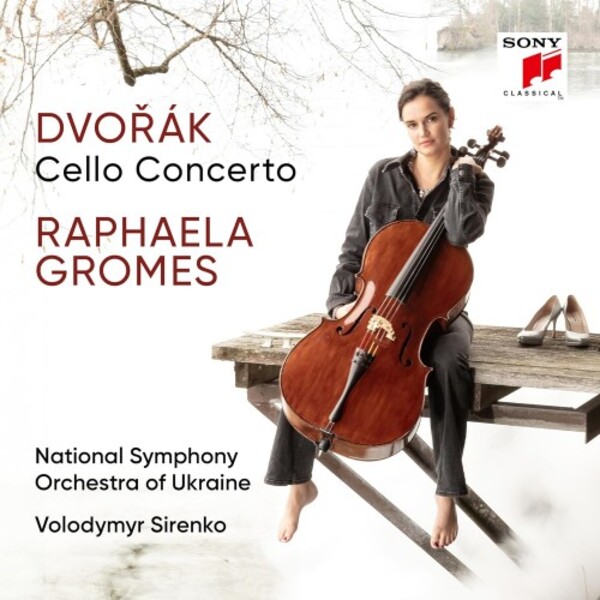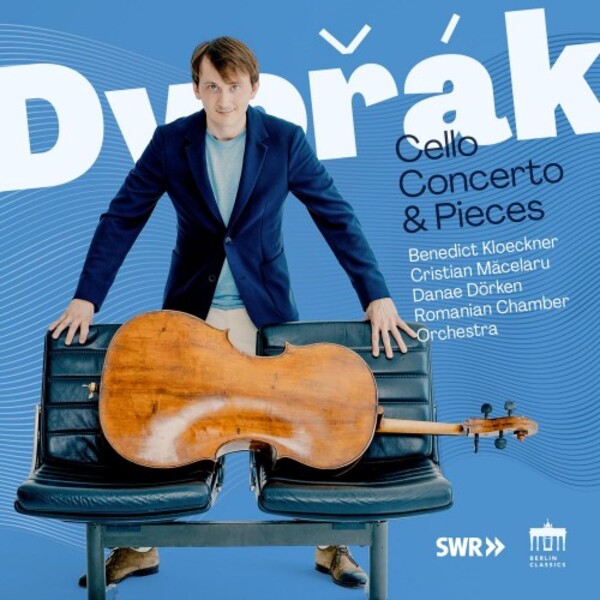DVOŘÁK Cello Concerto (Benedict Kloeckner. Raphaela Gromes)
View record and artist detailsRecord and Artist Details
Genre:
Orchestral
Label: Sony Classical
Magazine Review Date: 11/2024
Media Format: CD or Download
Media Runtime: 53
Mastering:
DDD
Catalogue Number: 19802 82574-2

Tracks:
| Composition | Artist Credit |
|---|---|
| Concerto for Cello and Orchestra |
Antonín Dvořák, Composer
Raphaela Gromes, Cello Ukraine National Symphony Orchestra Vladimir Sirenko, Conductor |
Genre:
Orchestral
Label: Berlin Classics
Magazine Review Date: 11/2024
Media Format: CD or Download
Media Runtime: 73
Mastering:
DDD
Catalogue Number: 0303412BC

Tracks:
| Composition | Artist Credit |
|---|---|
| Concerto for Cello and Orchestra |
Antonín Dvořák, Composer
Benedict Kloeckner, Cello Cristian Măcelaru, Conductor Romanian Radio Chamber Orchestra |
| From the Bohemian Forest, Movement: Silent woods |
Antonín Dvořák, Composer
Benedict Kloeckner, Cello Danae Dorken, Piano |
| (4) Songs, Movement: Leave me alone |
Antonín Dvořák, Composer
Benedict Kloeckner, Cello Danae Dorken, Piano |
| Polonaise |
Antonín Dvořák, Composer
Benedict Kloeckner, Cello Danae Dorken, Piano |
| Rondo |
Antonín Dvořák, Composer
Benedict Kloeckner, Cello Danae Dorken, Piano |
| (16) Slavonic Dances, Movement: No. 8 in G minor |
Antonín Dvořák, Composer
Benedict Kloeckner, Cello Danae Dorken, Piano |
| (7) Gipsy Melodies, 'Zigeunerlieder', Movement: No. 4, Songs my mother taught me |
Antonín Dvořák, Composer
Benedict Kloeckner, Cello Danae Dorken, Piano |
Author: Charlotte Gardner
It must be a rare cellist who doesn’t feel deeply about Dvořák’s Cello Concerto, that lyrical cello song wrapped in a mighty symphony, melding grandeur and Czech spirit with a heart-wrenching cry of sorrow over the death of his beloved sister-in-law. The question is more of how they feel it; and with recording it, why and how, given that it’s not just a crowded field but a competitive one.
Young German cellist Raphaela Gromes grew up loving the work, but the catalyst to record it came in December 2023 when, in a show of solidarity in the face of Russia’s invasion of Ukraine, she travelled to Kyiv to perform it with the Ukrainian National Orchestra and its Chief Conductor Volodymyr Sirenko. Impressed and moved, she reunited with them two months later in Lublin, Poland, to studio-record it, surrounded by four short Ukrainian pieces newly arranged for cello and orchestra by her longstanding duo partner Julian Riem. These Ukrainian pieces are a beautifully executed, emotive listen. Valentin Silvestrov’s Prayer for Ukraine (2014), opening the disc, was their encore in Kyiv, and if that encore had anything like the degree of intensity, sensitivity and soul-filled song that’s heard here (with not a whit of mawkishness, I should add), then the audience can only have been in pieces. Following the Dvořák, Hanna Havrylets’s Tropar, Prayer to the Holy Mother of God (2018) and Yuri Shevchenko’s 2014 paraphrase on the Ukrainian national anthem, We Are, are of a similar softly elegiac vein. But just as you’re thinking you could do with something more upbeat, along comes the resistance song by Stepan Charnetskyi (1881-1944), Oi u luzi chervona kalyna, to play us out in more up-tempo optimism – and Gromes is right in there with her Ukrainian colleagues for brightly brisk, folk-meets-military swagger.
On to the Concerto, and Gromes’s aim (as expressed in a booklet-note interview) was to get back to the score and away from Rostropovich and Karajan’s luxurious, heart-on-sleeve reading for DG. Certainly her tempos move along slightly more apace than those of that 1968 benchmark, and the orchestra for the most part is right at her side – I love, for instance, how airily sprightly the flutes’ Allegro quaver interjections are from bar 187. I also love the combination of silky polish and faithful detail with which Gromes realises the score’s many dynamic markings, the smooth-edged definition of her little sforzando pushes among the many treats, while simultaneously sounding so warmly, effortlessly lyrical. Yet for all the pleasure of Gromes’s velvety-rich lyricism and technical polish, she is too far forwards in the balance for a work so expressly symphonic in nature, and so full of dialogue. It’s especially noticeable when she’s supplying accompanying arpeggios and through the central movement, with all its wonderful woodwind-writing.
The balance is considerably more satisfying between Benedict Kloeckner and the Romanian Chamber Orchestra with Cristian Măcelaru. Perhaps it’s this – or perhaps the brightness of the sound, or just a firmer architectural grasp from Măcelaru – that means that, despite each of their movements being within seconds of the aforementioned Rostropovich/Karajan, the orchestra sounds not just more centred than the Ukrainian Symphony but also more driven, momentum-filled and punchily vibrant, matching Kloeckner’s own sinewy energy. There’s also a tremendous dynamic range from everyone – listen to the hush before the concerto’s very final shout. And the joy, sparkle, welly and song from this orchestra! Get a load of the exuberant first-movement duet between Kloeckner and the first violin, and the delicious playfulness the flute suddenly injects into his central-movement quasi-cadenza. There’s an off-the-cuff excitement that includes the occasional messy second from Kloeckner, but frankly that just adds to the atmosphere.
Space precludes in-depth critique of the six shorter Dvořák works that follow but Kloeckner and Danae Dörken’s partnership sounds deep and close, and their readings are clearly jointly conceived and entirely theirs, articulated with an endless variety of colour and expression, captured with corresponding evenly weighted, natural immediacy. This may become the section of the programme I’ll make the most frequent returns to.
Gromes’s disc captures an emotionally charged moment in time via accomplished, soul-filled playing. This gives it a special resonance, and the Ukrainian works are its biggest jewel. As an overall package, Kloeckner’s sounds more satisfying and jointly conceived; and while I’m not sure his concerto topples any of the greats off their perches, it’s great stuff.
Discover the world's largest classical music catalogue with Presto Music.

Gramophone Digital Club
- Digital Edition
- Digital Archive
- Reviews Database
- Full website access
From £8.75 / month
Subscribe
Gramophone Full Club
- Print Edition
- Digital Edition
- Digital Archive
- Reviews Database
- Full website access
From £11.00 / month
Subscribe
If you are a library, university or other organisation that would be interested in an institutional subscription to Gramophone please click here for further information.




